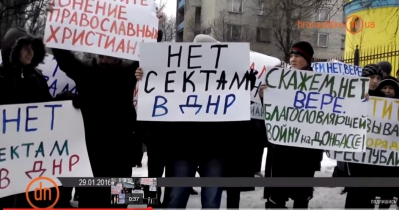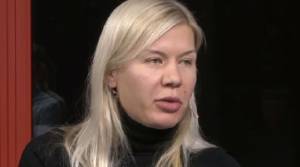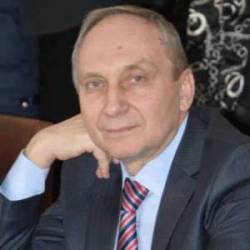New wave of ’arrests’ & attack on Ukrainian churches in militant-controlled Donetsk

Kremlin-backed militants in Donetsk are reported to have seized a number of local residents, including a volunteer Marina Cherenkova and religious specialist Ihor Kozlovsky and are holding them prisoner. The news coincides with an orchestrated demonstration in Donetsk against the Ukrainian Greek-Catholic Church and what were termed “other sects” deemed to be Western-funded and supporting the Ukrainian Armed Forces.

Marina Cherenkova is the leader of a volunteer initiative ‘Responsible Citizens’. According to another member of the group, Enrique Menendez, militants turned up at her home in Donetsk on Friday evening. She had time to write a text message saying that she had been detained by the ‘MGB’, the ‘security ministry’ of the so-called ‘Donetsk people’s republic’ [‘DNR’]. She has played a vital role throughout the military conflict in getting humanitarian aid to civilians. According to Yevhen Shibalov, Menendez has been warned he could be next, and told to leave or go into hiding.
Ihor Kozlovsky, President of the Centre for Religious Studies and International Spiritual Relations, is well-known in Donetsk. He had remained in the city to care for his son who has Down Syndrome and is confined to a wheelchair. Relatives and friends report that the militants burst into his flat and took Kozlovsky away, without giving any explanation. They left his son without any care, and relatives were only allowed access to him the following day. The militants also removed computer equipment, documents and a collection of antiques.
Kozlovsky has now been held, probably in a basement, for the last 3 days. IV Vlada links his ‘arrest’ with the attempt to blow up the monument to Lenin in Donetsk a few days earlier. According to a well-known Donetsk blogger, “the Russian occupation administration has activated its repressive measures since New Year, making them more large-scale”. Those suspected of pro-Ukrainian views are classified as ‘spies’ and ‘terrorists’ which, according to what the ‘DNR’ refers to as its laws, can result in 30-year sentences or the death penalty.

Two well-known journalists – Alexei Matsuka and Denis Kazansky – have reported that the militants are carrying out a mass campaign seizing ‘dissidents’.
Kazansky writes that he cannot give names at the moment, but that lies about peaceful life returning should be rejected. There is total lawlessness, he says, with militants bursting into people’s flats and taking them away without any explanation. He adds that these are not ‘pro-Ukrainian activists’ who have long left, but those whose neighbours or work colleagues ‘denounce them’, those who’ve recently travelled to areas under Ukrainian government control or believers from Protestant churches.
The militants do appear to be also returning to attacks on other faiths. An organized demonstration was held on Jan 29 outside a Greek-Catholic church in Kremlin-backed militant-controlled Donetsk with the participants reported to have called on militant leader Alexander Zakharchenko “to drive out sectarians”, who are alleged to be Western-paid or even linked with the CIA. According to News of Donbas, the demonstrators were public sector workers brought in by buses, and the video certainly gives reason for suspecting that most people did not know why they were there.
The event was clearly supported by the leaders of the so-called ‘Donetsk people’s republic’ who reported it as a protest “against the propaganda of war and help by Greek-Catholics given to the Ukrainian Armed Forces”.
The official website cited a couple of ‘residents’ who would appear to have been more capable of articulating official thoughts than those on the video. One accuses the Greek-Catholic Church of gathering humanitarian aid from believers and giving it to the Ukrainian Army and of “preaching war and foisting the idea of ‘Independent Ukraine’ on our residents, especially young people”. The other claims that everybody is “against these sects which are paid for from the West.”
The meeting – described as ‘spontaneous’ – was announced the day before by Sergei Kondrykinsky, who calls himself a ‘DNR MP’ and head of the ‘Young Republic’ [Molodaya Respublika] organization. He asserted that they are closely studying how “such sects” work on young people, and where they get their money. “One clearly sees the work of the CIA” here.
Most ominously, he claimed that these so-called ‘sects’ aim to undermined ‘DNR’. In a different text, reported in both Russian and English on the ‘DNR’ official website, he states that “European values are alien to us, we should support our Russian traditions”.
Reports have suggested that the militants, together with those in Russia who pull their strings, are pushing certain pro-militant formations, like ‘Young Republic’ to create the appearance of elections in April. As reported, Zakharchenko stated recently that Ukrainian parties will not be allowed to take part.
Kondrykinsky’s line is very much that taken from when Kremlin-backed militants, backed by Russian fighters, first gained control in parts of Donbas. The only Church which did not suffer repression was the Orthodox Church under the Moscow Patriarchate.
In the report ‘When God becomes the weapon’ published in May 2015, rights activists detailed widespread and systematic persecution of all religious groups except those linked with the Moscow Patriarchate in militant-controlled parts of Donbas. It also pointed to the role of Russia and its armed criminal ‘crusaders’ in mounting crimes against humanity in the region. They identified widespread religious persecution from April 2014, and noted the major role played by unlawful armed groups who “under the banners of the Russian Orthodox Army and the Cossack Army, openly manifest their adherence to orthodoxy and have begun a ‘crusade’ across the Donbas region’.
While conflicts have arisen between differing armed formations, especially in ‘LNR’, this adherence to a specific form of Orthodoxy and political ideas around this is largely shared by all pro-Russian militants.
According to the ‘DNR’ ‘constitution’, issued on May 16, 2014 “the leading and dominant faith is the Orthodox faith ... as professed by the Russian Orthodox Church (Moscow Patriarchate). The historical heritage and role of the Russian Orthodox Church (Moscow Patriarchate) are recognized and respected, including as a main pillar of the Russian World doctrine ".
This concept of a supposed ‘Russian World’ – encompassing Ukraine, Belarus and Moldova, as well as Russia itself – has been repeatedly endorsed by Russian President Vladimir Putin, and by the head of the Russian Orthodox Church Patriarch Kirill. The latter stated in November 2009, that “if we consider the Russian Federation with its present boundaries, then we have sinned against the historical truth and artificially cut off millions of people who are aware of their role in the fate of the Russian World and consider its creation their main deed.”
As reported here, there were numerous abductions of members of all other faiths in occupied areas, and four members of a Sloviansk Evangelical Church were murdered in June 2014.
There had been less reports of problems over recent months, although this is doubtless largely due to the fact that very many people from faiths under fire have left. The degree of organization behind this ‘spontaneous demonstration’ and especially the claim that the Greek-Catholic Church and “other sects” are funded by the West and aimed at undermining the Kremlin-backed militants’ ‘republic’ may indicate that the relative lull is over.
The escalation in anti-religious rhetoric, and in ‘arrests’ of dissidents come at a time when the West is continuing to negotiate ‘elections’ in militant-controlled Donbas, an amnesty and ‘special status’ for these Kremlin-controlled ‘republics’.





